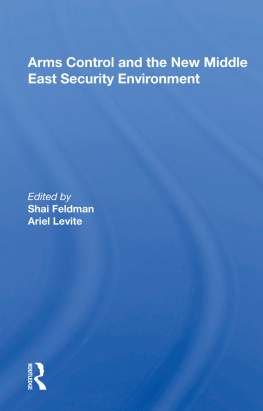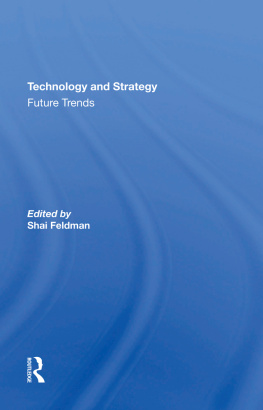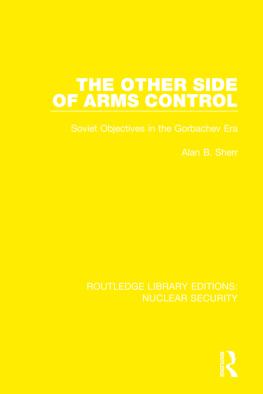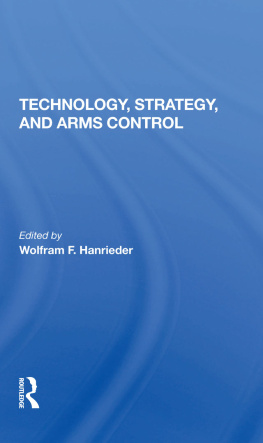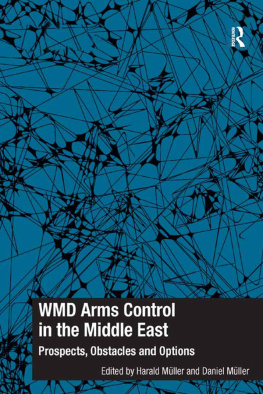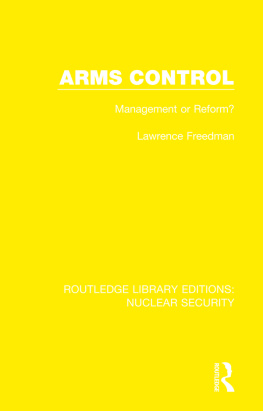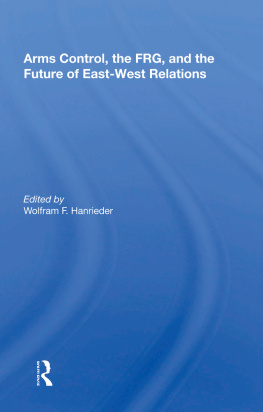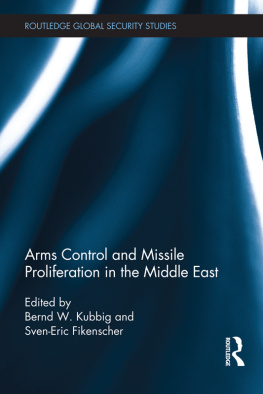JCSS Study no. 23
Arms Control and the New Middle East Security Environment
edited by
Shai Feldman and Ariel Levite
First published 1994 by Westview Press
Published 2018 by Routledge
52 Vanderbilt Avenue, New York, NY 10017
2 Park Square, Milton Park, Abingdon, Oxon OX14 4RN
Routledge is an imprint of the Taylor & Francis Group, an informa business
Copyright 1994 by Tel Aviv University, Jaffee Center for Strategic Studies
All rights reserved. No part of this book may be reprinted or reproduced or utilised in any form or by any electronic, mechanical, or other means, now known or hereafter invented, including photocopying and recording, or in any information storage or retrieval system, without permission in writing from the publishers.
Notice:
Product or corporate names may be trademarks or registered trademarks, and are used only for identification and explanation without intent to infringe.
CIP data available upon request
ISBN 13: 978-0-367-00925-0 (hbk)
The Ginosar Conference on Arms Control and the New Middle East Security Environment was conducted within the framework of the Project on Security and Arms Control in the Middle East of Tel Aviv University's Jaffee Center for Strategic Studies. We could not have embarked on this project without the encouragement and consistent support of the late founder, builder and Head of the Center, Major General Aharon Yariv-a rare breed of an officer, gentleman and scholar, a man of great vision who was also blessed with the capacity to implement his dreams with wisdom, finesse, and endless energies. We were fortunate to have worked with General Yariv for many years. His recent death has left a huge void and we will sorely miss him.
Funding for the project was provided by the Ford Foundation. We are particularly grateful to Enid Schoettle, who at the time served as Director of the International Affairs Program of the Ford Foundation, for her support. We are also indebted to Steven M. Riskin, then-Program Officer at the Ford Foundation, for his assistance. Finally, thanks to Shephard Forman, current Director of the International Affairs Program, and to Geoffrey Wiseman, for their continued support.
Financial assistance for the participation of some of our American colleagues was provided by the United States Information Service. We are grateful to Martin Quinn, Cultural Attache at the US Embassy in Israel, and to Anne Walter of the US Cultural Center in Tel Aviv, for their help in securing these funds.
Additional funding for the conference was provided by the IDB Bankholding Corporation Ltd. We are very grateful to Raphael Recanati and to Udi Recanati of IDB for their longstanding support for the Center's activities.
A large part of the administrative burden of holding the conference was shouldered by Sam Wiedemann. His commitment and devotion were indispensable in overcoming numerous organizational problems involved in running a relatively large international meeting. Also, many thanks to Sharon Rudich who volunteered to be my research assistant during the summer of 1991 and returned to assist us during the conference. Thanks for their assistance are also due to Taly Shilo and Emily Landau of JCSS, who attended to the many details associated with the production of the conference and the book. The Ginosar conference involved particularly complex logistics because it was opened in Tel Aviv, held at Nof Ginosar on the shores of the Sea of Galilee, involved tours of parts of the country, and concluded in Jerusalem. This complexity could have become a nightmare were it not for the efficiency of liana and Shai Segev of Zabar Tourism Services and Tamar Muller of Ezoori Travel.
We owe a special word of thanks and an apology to Willy Kempel of the Austrian Embassy in Tel Aviv and to Alexander Konovalov of the USA-Canada Institute of the Russian Academy of Sciences in Moscow. Both provided excellent briefings at Ginosar~the former devoted his presentation to the then-proposed Chemical Weapons Convention and the latter to the evolving situation in the former Soviet Union. But because these timely briefings were soon overtaken by events, we decided not to include them in this volume.
Finally, particular thanks to Joseph Alpher, Director of the Center, for his editing suggestions and other help in bringing this monograph to print.
Shai Feldman
Director, Project on
Security and Arms Control
in the Middle East
Ariel Levite
Senior Research
Associate
Tel Aviv, June 1994
Shai Feldman
This volume incorporates the talks delivered at a conference on "Arms Control and the New Middle East Security Environment," held in Ginosar (Israel) in January 1992. The conference was organized within the framework of the Project on Security and Arms Control in the Middle East conducted by Tel Aviv University's Jaffee Center for Strategic Studies. Some 28 scholars from eight different countries, together with some 30 Israelis, took part in the conference deliberations.
When the Jaffee Center's arms control project was launched in 1990, the subject of arms control was foreign to all Middle East countries, including Israel. Having assessed that developments in the region would soon place the topic on the region's agenda, we saw an acute need to educate and socialize members of Israel's policy elite regarding the issues involved. For this purpose, the Ginosar Conference was designed to expose Israelis--scholars, government officials and senior members of the media--to international scholars and former officials well versed in the subject.
The objective of the conference was to air the experience gained in arms control in other regions--primarily but not exclusively in the US-Soviet and NATO-Warsaw Pact context--and to familiarize Israelis with this experience. In addition, a significant effort was made to examine the effects of the new Middle East security environment that was emerging after the end of the Cold War, the breakup of the Soviet Union and the 1990-91 Gulf War, on the prospects for applying arms control in the region. From the outset, our interest in the subject was broad, encompassing not only arms reductions and non-proliferation, but also confidence- and security-building measures (CBMs) as well as the means for verifying compliance with the various agreements reached.
Meanwhile, developments in the region confirmed the expectations and assumptions guiding our project's design. And as it turned out, the Ginosar Conference could not have been more timely. Thus, soon after we met in Ginosar, the Middle East Multilateral Conference was held in Moscow, launching the complex deliberations of the working group on Arms Control and Regional Security (ACRS) in the Middle East. This produced immediate demand for education on the issues involved.
These unique circumstances also explain our decision to produce this volume despite the very late publication date. First, we feel we owe this to our colleagues, in Israel and abroad, who were not privileged to share our deliberations at Ginosar. Secondly, we believe that students of the Middle East might find it useful to have a picture of the factors that affected the prospects for applying arms control measures in the region when the multilateral process was launched. Finally and most significantly, our examination and editing of the texts convinced us that they contain significant insights and original analysis to merit publication.

